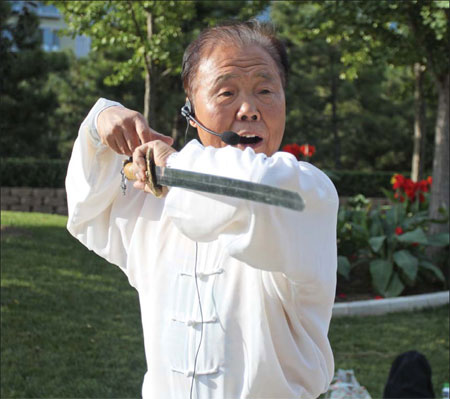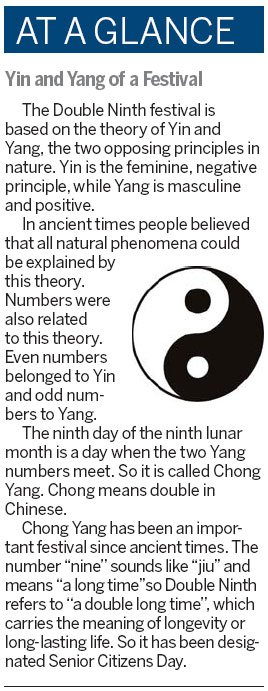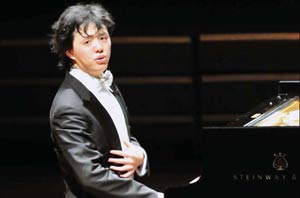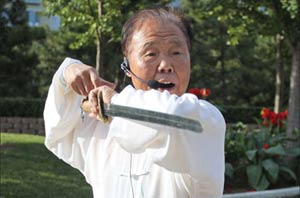Old school
Updated: 2011-10-07 10:16
By Yin Yin (China Daily)
|
|||||||||
|
|
Retired civil servant Yang Jiaxiu and his wife Gao Xiulan, a former landscape engineer, have been teaching taichi in a Beijing public park for more than 12 years. Yang teaches swordplay to senior men while Gao holds taichi fan classes for women.
|
|
In a very fast-changing Chinese society, where the nation's single-child policy has been in place for more than three decades, the seniors' issue has been a hot media topic in the lead-up to the Double Ninth Festival, which this year falls on Oct 5.
The festival focuses on the traditional virtue of honoring, respecting, loving and helping the elderly and is named such because it occurs on the ninth day of the ninth lunar month.
The seniors' issue is of such a concern because their numbers are growing rapidly. According government statistics, between 2011 and 2015 the number of Chinese seniors aged over 60 years, will surge from 178 million to 221 million. The proportion of elderly population will increase from 13 to 16 percent.
Although seniors are still in close touch with their children, many live alone and say when they retire that they feel lonely, lost and bored.
After retiring 13 years ago, Yang and Gao did not know how to spend their time even though their daughter still lived with them.
"I felt frustrated and bored in the transitional period after my retirement," Yang says. "I often felt depressed because I don't have many things to do.
"When I started to teach taichi I felt fulfilled and it was also a good opportunity to make more friends. Every day seems to be a festival."
"I am skilled in taichi and it has a lot of benefits for old people, for example, better breathing, better sleep and most importantly preventing dementia," he says.
"The purpose of teaching taichi is that I want to provide a platform to the elderly, gather the empty nesters together to keep healthy and kill their humdrum ways."
The Double Ninth festival reminds more people to pay closer attention to their elders.
"I intend to see my grandmother and grandfather and take traditional cakes to them," says Yi Xinyu, 23, who works for an exhibition company.
"The Double Ninth Festival falls right in the middle of the national holidays, so it is a good time for family gatherings. We can take a stroll in the park and see the blooming chrysanthemums."
During this festival, Chinese like to visit mountains, enjoy the views and feel the bright and clear autumn sunshine, and the climbing act is symbolic of a long life.
Another symbol of longevity is the dogwood tree, which was very popular during the Tang Dynasty (AD 618-907). It was believed that planting dogwood could help prevent diseases and avoid disasters.
Seniors appreciate the extra attention received during the festival, but are also conscience of being self supporting. "The most important thing is keeping healthy and reducing the burden on my daughter, and my taichi classes help with this," Yang says.
"What I have discovered that is also great is being able to help others. Most students in my class have gradually grasped taichi and have made friends with various people."
But life for both the young and old is never perfect, and over the past decade Yang has faced criticism and controversy. He says some people have been quick to judge his taichi methods and make a scene. Of one critic, he says: "When I came up against the problem, I did not argue with him and demonstrated my taichi actions step by step. By the end, I told him all my actions were from the national unified teaching materials."
Yang also experienced trouble from his students, who he says used the group as a dump for their personal problems.
"Some people used to bring their neighborhood's problem to the course, or when the learners exchange their views, they might give rise to conflict.
"When dealing with these problems, harmonious relationship is the most important thing. I persuaded them not to bring their personal problems into the course because it is unfair to other learners and always a waste of time.
Gao also has her challenges, but says most of the women like to talk about their home life, cooking, and especially about finding partners for their children and grandchildren. Some share their life experiences and reminisce about their youth.
"Friendship is one of the best medicines for loneliness, and an increasing number of old people in our class have become friends. After class they go to the market together or make appointments to meet at other times. "
Yang says his biggest Double Ninth festival wish is for more elderly people to take part in fulfilling activities, and make even more friends.











